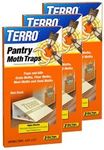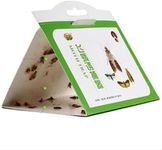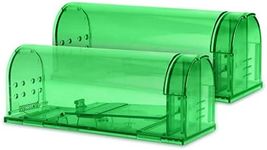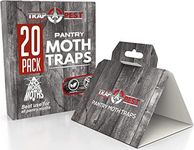We Use CookiesWe use cookies to enhance the security, performance,
functionality and for analytical and promotional activities. By continuing to browse this site you
are agreeing to our privacy policy
Best Pantry Moth Traps
From leading brands and best sellers available on the web.#2

Terro
Terro 2900 Pantry Moth Trap, 2 Traps (3 Pack, 6 Traps Total)
View Product
#3

QMIQMI
5 Moth Traps Garment Moth pheromone Traps More Effective Moth Traps Pantry Moth Traps Meal Moth Traps Green Food Moth Traps
View Product
Buying Guide for the Best Pantry Moth Traps
Choosing the right pantry moth trap is important for keeping your food storage areas free from pests. Pantry moths can quickly infest grains, cereals, and other dry goods, so a good trap helps you monitor and control their population. When shopping for a pantry moth trap, it's helpful to understand the key features that make a trap effective and easy to use. By focusing on the right specifications, you can select a trap that fits your needs and keeps your pantry protected.Type of AttractantThe attractant is the substance used in the trap to lure pantry moths. Most traps use pheromones, which are chemicals that mimic the scent female moths release to attract males. This is important because it targets the breeding cycle, helping to reduce the population over time. Some traps may use food-based attractants, but pheromone-based traps are generally more effective for pantry moths. When choosing, look for traps that clearly state they use pheromones specifically for pantry moths, as not all moths are attracted to the same type. If you have a persistent problem, pheromone traps are usually the best choice.
Trap DesignTrap design refers to the shape and construction of the trap, such as flat sheets, tent-style, or box-shaped traps. This matters because the design affects where you can place the trap and how well it contains the moths. Flat traps are easy to slide into tight spaces, while tent or box designs can stand on shelves and may be less messy. If you have limited space, a flat design might be best, but if you want something more visible and easy to check, a tent or box design could be preferable. Consider your pantry layout and where you plan to place the traps when making your choice.
Coverage AreaCoverage area describes how much space a single trap can effectively protect. Some traps are designed for small cabinets, while others can cover larger pantry spaces. This is important because using too few traps in a large area may not control the moths effectively. If you have a large pantry or multiple storage areas, you may need several traps or a product that specifies a larger coverage area. Always check the manufacturer's recommendations and match the number of traps to the size of your pantry for the best results.
LongevityLongevity refers to how long the trap remains effective after being opened. Most pantry moth traps last between one to three months, depending on the brand and environmental conditions. This is important because expired traps lose their ability to attract moths, making them less useful. If you want a low-maintenance solution, look for traps with a longer lifespan. However, if you are dealing with a severe infestation, you may need to replace traps more frequently. Always check the packaging for how long the trap will work and plan to replace them as recommended.
Safety and Non-ToxicitySafety and non-toxicity are crucial, especially since these traps are used near food. Most pantry moth traps are non-toxic and safe for use around children and pets, but it's always good to double-check. This is important to prevent accidental exposure to harmful chemicals. If you have young children or pets, prioritize traps that clearly state they are non-toxic and safe for use in food storage areas. This ensures peace of mind while keeping your pantry moth-free.
Ease of Use and DisposalEase of use and disposal refers to how simple it is to set up the trap and throw it away when it's full. Some traps require you to peel and stick, while others may need a bit more assembly. This matters because a trap that's easy to set up and dispose of will save you time and hassle. If you prefer a hands-off approach, look for traps that are ready to use out of the box and can be thrown away without touching the trapped moths. Consider your comfort level with handling the traps when making your choice.







